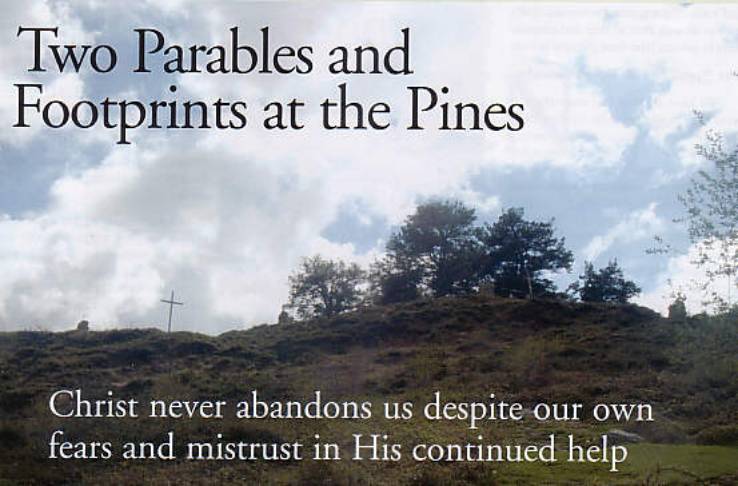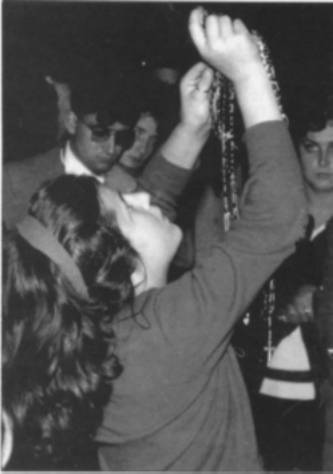Two Parables and Footprints at the Pines (Gabriel Garnica)
Two Parables and Footprints at the Pines
Reprinted with kind permission from GARABANDAL International July-September 2005
Written by Gabriel Garnica
One of the key purposes of Garabandal is to bring people back to the fold. It also reminds us that we should be reflexions of holiness and goodness to the best of our abilities.

Two of Our Lord’s best known parables are The Parable of The Foolish Steward and The Parable of The Ten Talents. Likewise, most if not all of us have read the poem which shows a set of footprints in the sand.
The Steward parable tells of a dishonest manager who reduces the debts of his master’s debtors upon learning that he will soon be fired. The Ten Talents parable tells of three servants entrusted with 5,2, and 1 talent by their master who rewards the first two for increasing his investment but punishes the third for merely hiding it out of fear and mistrust. The poem tells us that Christ never abandons us despite our own fears and mistrust in His continued help. Taken together, these two parables and this poem vividly reflect the message of Garabandal.
God Invests in Us
The first lesson of these parables and poem is that each of us is an investment by God in the marketplace of salvation. Each person is endowed with certain gifts and talents from God Almighty which He has invested in each of us to suit His purpose and plan for saving souls. This assertion speaks of both God’s love for us and of our value as creatures of God well suited to serve and glorify Him.
We Each Have a Purpose and Mission
If we accept the fact, as we must, that God is all-perfect, all-knowing, and incapable of error or misjudgment, then we must suppose that God’s investment, His purpose, for each of us is inherently good and beneficial to both His Will and our salvation. Thus we see that God’s investment in us, as evidenced by the unique gifts and talents that He has given each of us, serves the purpose of saving souls and spreading His Will and Word.
Since anything that is inherently good must be so because it honors God in one way or another, then it stands to reason that our mission and purpose in life is to spread God’s Will and Word while glorifying His Name. The Almighty has given each of us the particular tools with which we can accomplish this purpose and mission. It is up to each of us to recognize and apply these gifts for that purpose. To the extent that we either ignore these gifts or apply them for our own glory over God’s, we are misusing these treasures from The Almighty.
From Good for Good
Just as the ancients offered their sacrifice in thanks, petition, adoration, and recognition of God’s generous and merciful love, so too we are called to take God’s investment in us and re-invest that bounty in serving The Almighty’s purpose and mission for our lives. If we use our talents for evil, selfish, or destructive purposes, then we will not be returning God’s gifts to Him showing interest or profit, but rather loss and waste. We are called to reward God’s trust in us with trust in Him and commitment to serving Him through those talents.
The Bread of Life Drops Crumbs
We have all been lost somewhere at some time in our lives. As we frantically seek our way, we often lose our bearings and begin to spin our wheels or go in circles. Often our dire need combines with isolation and despair to make our struggle wasteful and without purpose. The Footprints poem tells us that despite our fears and doubts, Christ is and will always be with us if we keep Him in our minds, hearts, and souls. Faced with a single set of footprints, we sometimes conclude that we walked alone. The poem tells us that Christ will show us that those footprints were His as he carried us. We may perhaps see those footprints as guides to salvation. It makes perfect sense that The Bread of Life, He who broke bread at The Last Supper, should drop bread crumbs for us to follow on our way to salvation. The footprints, then, are guides to paradise as well as evidence of past journeys.
Despite our fears and doubts, Christ is and will always be with us if we keep Him in our minds, hearts, and souls.
The Garabandal Message
From the very beginning it was evident that the visionaries were intended to serve as instruments conveying God Almighty’s messages of prayer, love, peace, and sacrifice.

The fact that The Blessed Mother requested that the girls give objects to the crowd to be kissed, that she asked them to pray aloud and in the outdoors, and that the entire Garabandal events were so public, so open to all, tells us that, in the words of Jacinta, the purpose of all of this was “that everybody may believe”. We see, therefore, that one of the key purposes of Garabandal was to bring people back to the fold. Likewise, in 1970 Conchita wrote that we should strive that whoever looks at us may see The Blessed Mother. Therefore, another purpose of Garabandal is to remind us that we should be reflections of holiness and goodness to the best of our abilities. In another letter in 1970 Conchita wrote that we should strive for sacrifice, penance, and prayer, and “empty your heart of the worldly things that prevent you from listening to God”. Here we see that yet another purpose of Garabandal is to remind us that we cannot serve God or fulfill our purpose of bringing others to Him unless we become vessels of His love, mercy, and kindness. It is obvious that we cannot fill ourselves of God unless we empty ourselves of this world! Conchita has often said that we must be open and listen to God in order to know the path He asks of us. A great part of that path, judging by the words and actions of the visionaries, is bringing souls to salvation.
Garabandal reminds us that God loves us very much and wants us to both save ourselves and help others to do so. The mere fact that God is all good and that He made us should attest to our inherent goodness and value, but that value and goodness must be used for constructive purposes to serve its value. As Christ said, a light under a bushel is of no use to anyone. The Garabandal Message, as shown by the words of The Blessed Mother and the words and actions of the girls, tells us of a three-way investment. First, God has invested His loving creative power in creating us. Second, as in the parables noted above, God created us for the purpose of spreading good and the subsequent salvation that goodness brings. Lastly, it is our purpose as children of God to take His great gifts and generate profitable interest in the form of service, love, penance, sacrifice, prayer, and example to others. We see that the message of Garabandal, like our parables, reminds us that we each have a purpose, a mission, that can only be fulfilled if we follow the bread crumbs left for us by The Bread of Life, Christ Himself. The footprints poem reminds us that Christ has provided the steps to that salvation and mission. It is up to us to use our free will to honor God’s investment in us by placing ourselves in His service.
Christ once stated that we must not pray or do good works to glorify ourselves. He stressed the value of keeping .our piety and good works humble and secret. However, Christ Himself and The Garabandal Message remind us that prayer and good works meant to glorify and serve God should not always be secret since they serve to save souls and therefore fulfill God’s purpose for our lives. Even though each of the girls had unique talents, skills, personalities, and aptitudes, God Almighty used each to save souls and serve His purpose. The parables, the poem, and The Garabandal Message tell us that we have each been given the potential to light the way to salvation for others. We can decide to use that light productively to reward and serve God’s investment in us or hide that light under a bushel!
Conclusion
As often happens, we see that The Message of Garabandal mirrors the words and examples of Christ. Its theme is the same theme found in The Foolish Steward, The Ten Talents, and The Footprints. God has invested in us with gifts and talents with which we may carve and shape the mission and purpose that God has prepared for us. Whatever forms that mission and purpose may take, its ultimate goal will be the same for all of us. Namely, this purpose is spreading God’s Will and Purpose while glorifying His Name and saving souls. Though we have each been given unique gifts like the unique gifts that The Wise Men brought to Christ, these gifts must be offered to God as a sacrifice and used for good and saving souls. Even though these Wise Men each had unique gifts and came from unique paths, their ultimate goal and purpose was the same. Likewise, despite our varied gifts and backgrounds, we are each called to use those gifts to honor God, do good, and save souls.
Reprinted with kind permission from GARABANDAL International July-September 2005
Written by Gabriel Garnica
Order your copy from GARABANDAL International Magazine,
Back for more Garabandal Information


